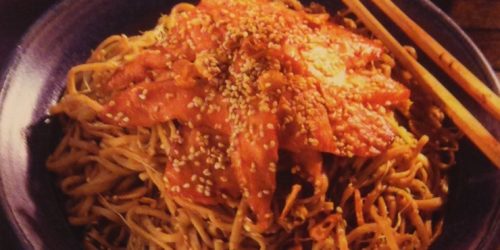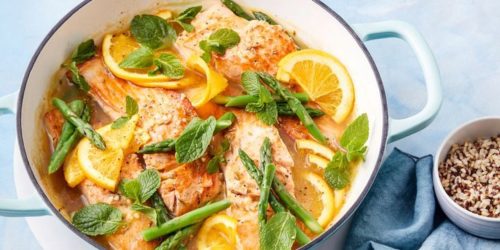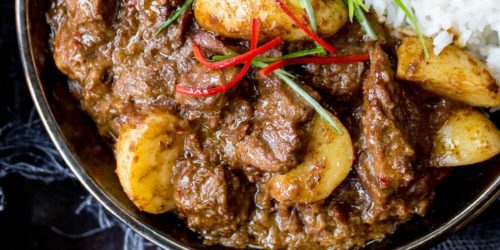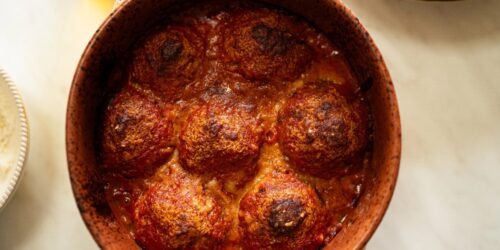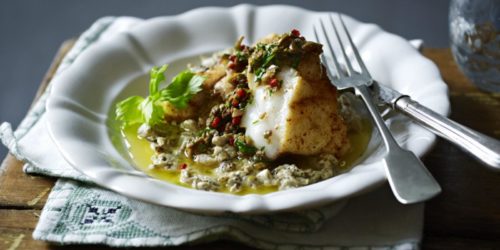Baked Aloo Gobi with Flatbreads
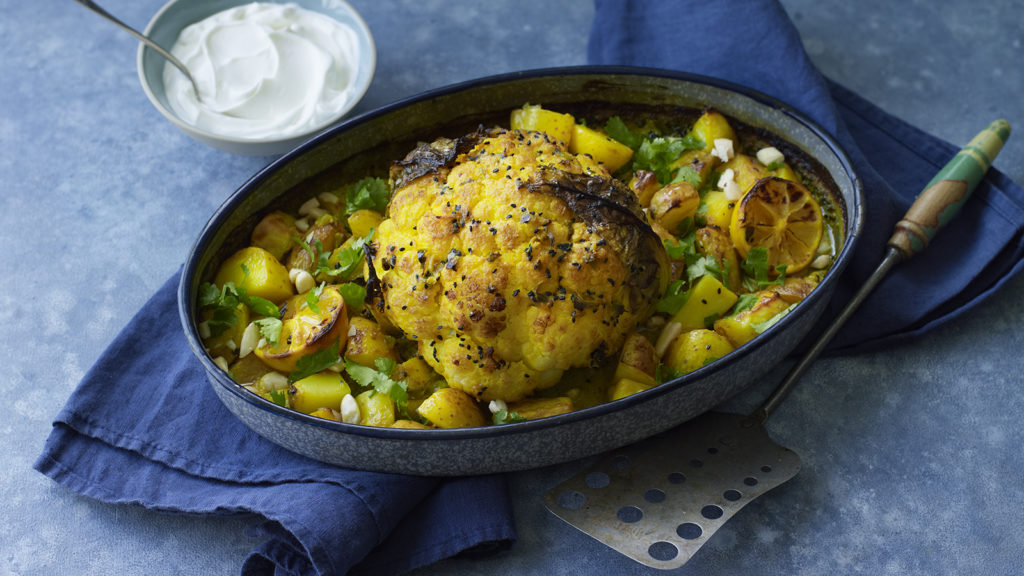
Whole baked cauliflower & potato curry.
Anna Jones – Saturday Kitchen
For the aloo gobi
- 1 large cauliflower, left whole
- 4 tablespoons coconut oil
- 1 inch piece of fresh ginger, peeled & grated
- 4 green chillies, deseeded & finely chopped
- 4 garlic cloves, crushed
- 1 tablespoon black mustard seeds
- 2 teaspoons ground turmeric
- 400ml tin coconut milk
- 1 unwaxed lemon, halved
- 600g potatoes, scrubbed, skin left on and cut into 2cm pieces
- salt and freshly ground black pepper
- 50g greek style yoghurt, to serve
- 25g blanched almonds, to serve
- coriander leaves, to serve
For the flatbreads
- 200g plain flour, plus extra for dusting
- 1 teaspoon baking powder
- 200g greek style yoghurt or 150ml warm water
Method
For the aloo gobi, using a sharp pair of kitchen scissors, cut the large leaves and stalks away from the outside of the cauliflower. You can leave the smaller leaves close to the florets – they will go nice and crispy when roasted.
Turn the cauliflower upside down and using a small pairing knife, carefully cut a hollow in the middle of the central stalk to help the cauliflower cook evenly. Take a casserole or lidded saucepan and half-fill it with water from the kettle and bring it to the boil.
Add salt to the pan, add the cauliflower, cover and simmer for 6 minutes. Drain the cauliflower and return to the pan off the heat, put the lid back on and leave the cauliflower to steam for 10 minutes.
Meanwhile, take another casserole dish and place over a medium heat. Heat the coconut oil, then add the ginger, chillies and garlic and cook for a few minutes, until fragrant. Stir in the mustard seeds and continue cooking until the garlic has softened. Add the turmeric and a big pinch of salt.
Pre-heat the oven to 220C/200C fan.
Pour the coconut milk into the casserole dish, stir well and season with a little pepper. Place the steamed cauliflower in a colander to drain off any water. When the milk starts to bubble gently, turn off the heat and place the cauliflower in the dish, then baste it with the coconut-spice mixture.
Add the lemon halves to the dish and scatter the potatoes around the cauliflower so they sit in the coconut milk.
Bake in the oven, basting the cauliflower occasionally with the sauce in the dish, for 40-45 minutes. You want it to catch a little on the top. To test if the cauliflower is cooked, insert a small sharp knife into the middle – it should be really tender and the potatoes and cauliflower should have soaked up most of the sauce.
Carefully remove the lemons and leave to cool slightly before squeezing them over the aloo gobi. Transfer the aloo gobi to a serving dish.
While the aloo gobi is baking, prepare the flatbreads. Place the flour, baking powder and yoghurt in the bowl off a food processor and pulse until the mixture forms a ball. If you don’t have a food processor, this can be done in a bowl using a fork to begin with, followed by your hands.
Tip the dough out on a clean work surface that is lightly dusted with flour. Knead for a minute or two. Put the dough in a flour dusted bowl and cover with a plate. Leave to rise for 10-15 minutes. It won’t rise like a normal dough but it might puff up slightly.
Dust a clean work surface and rolling pin with flour and divide the dough into 4. Using your hands, flatten the dough then roll into a 20cm circle, 2-3mm thick.
Place a large frying pan or griddle pan that is slightly larger than your flatbreads over a medium heat. Once hot, cook each flatbread for 1-2 minutes on each side, turning with tongs, until nicely puffed up.
Serve the aloo gobi with yoghurt, almonds, coriander and flatbreads.
